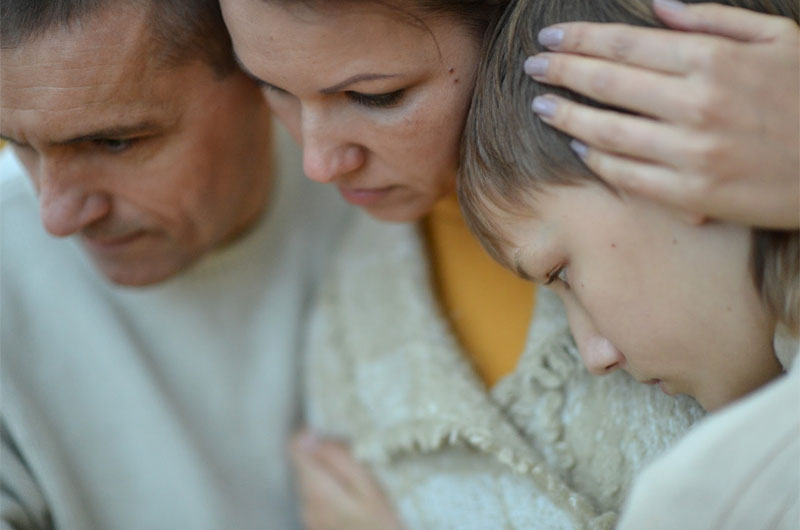In my dual role as a licensed counselor and the Chief Operating Officer of a long-term treatment program, I’ve witnessed the profound impact that addiction has on families. Through years of working closely with individuals and their loved ones, I’ve seen firsthand the heavy toll it exacts, not just on the individual struggling with substance use but on the entire family unit.
My experiences have offered me a unique perspective on the far-reaching consequences of addiction, encompassing financial, emotional, and spiritual dimensions.

Financial Impact
One of the most immediate and tangible effects of addiction on families is the financial burden. I’ve seen families drain their savings, sell assets, and accumulate debt in desperate attempts to cover the costs of treatment legal fees or to bail out their loved ones from the repercussions of their addiction.
In one case, a family chose to mortgage their home to finance a long-term treatment plan after their insurance coverage was exhausted. The financial strain can become a source of constant stress, leading to further instability within the family.
Emotional Toll
Emotionally, the toll is even more profound. Addiction sows seeds of mistrust, anger, and fear, eroding the fabric of family relationships. Parents, spouses, and children of addicts often live in a perpetual state of anxiety, never knowing if the person they love will come home safe or if a call from the police or hospital will shatter their world in the middle of the night.
I’ve counseled families torn apart by the deception and betrayal that often accompany addiction, where the emotional wounds run deep, and the process of healing is slow and painful.
Spiritual and Psychological Impact
Spiritually and psychologically, addiction creates a chasm between family members and their sense of peace and security. Families often grapple with questions challenging their beliefs and values, leaving them feeling lost and disconnected from their faith or spiritual anchors.
The constant chaos and uncertainty can lead to a profound sense of despair as family members struggle to reconcile their love for the person with the addiction with the havoc that addiction wreaks on their lives.
Interference with Security and Well-being
Addiction disrupts the fundamental need for security and well-being within the family. It can transform a home from a sanctuary into a battleground where fear and unpredictability reign.
Children in particular bear the brunt of the instability caused by addiction in the family, which can affect their emotional development, academic performance, and social relationships. The sense of desperation that envelops the family is palpable as each member tries to navigate the tumultuous waters of addiction, often feeling powerless and isolated in their pain.

Where Should Families Turn for Help With Addiction?
Many readers will know these experiences all too well. While there is no one-size-fits-all approach to addiction, there are certainly some good starting points that have helped millions of loved ones begin their recovery stories. I will include some of them below.
Support Groups
Al-Anon Family Groups
- Overview: A support group for friends and family members of individuals struggling with alcohol abuse.
- How to Contact or Visit: Visit Al-Anon’s website for meeting information and additional resources. Meetings are available both in-person and online.
Nar-Anon Family Groups
- Overview: Similar to Al-Anon, but specifically for family and friends of people struggling with drug addiction.
- How to Contact or Visit: Visit Nar-Anon’s website for meeting details and support materials. Offers virtual and in-person meeting options.
Families Anonymous
- Overview: A 12-step fellowship for family and friends of individuals with drug, alcohol, or behavioral issues.
- How to Contact or Visit: Visit Families Anonymous website for more information on meetings and resources. They offer both virtual and in-person meetings globally.
Alateen (part of Al-Anon)
- Overview: Specifically designed for younger family members and friends of those struggling with alcoholism, providing a supportive environment to share experiences and learn how to cope in a family affected by alcoholism.
- How to Contact or Visit: Visit Al-Anon’s website and navigate to the Alateen section for resources, meeting information, and how to get involved. Alateen meetings are available in person, online, and over the phone in some locations.
Our Recommended Books for Families
“Codependent No More” by Melody Beattie
- Overview: This foundational book delves into the dynamics of codependency, offering readers insights and strategies to free themselves from these patterns.
- How to Purchase: You can purchase it on Amazon or Barnes & Noble or at most major booksellers. It is also available in digital and audiobook formats.
“Beautiful Boy: A Father’s Journey Through His Son’s Addiction” by David Sheff
- Overview: This moving memoir offers a father’s perspective on his son’s struggle with addiction, capturing the challenges and triumphs of navigating recovery as a family.
- How to Purchase: It is available on Amazon, Barnes & Noble, and local bookstores. It is also available as an e-book and audiobook.
“The Realm of Hungry Ghosts: Close Encounters with Addiction” by Gabor Maté
- Overview: Dr. Maté presents a compassionate look at addiction, drawing on personal stories and scientific research to argue that addiction is not a personal failing but a complex interplay of personal history, emotional development, and brain chemistry.
- How to Purchase: You can find it on Amazon, Barnes & Noble, or your local bookstore. It is also available in digital and audiobook formats.
Finding an Interventionist
Association of Intervention Specialists (AIS)
- Overview: A network of professionals in addiction treatment who provide intervention services.
- How to Contact: Visit the AIS website at www.associationofinterventionspecialists.org. Here, you can find a directory of certified intervention specialists by location.
Locating a Private Therapist
Psychology Today
- Overview: Offers a comprehensive directory of therapists, counselors, psychologists, and psychiatrists based on location and specialization.
- How to Use: Go to www.psychologytoday.com, use the “Find a Therapist” search tool, and filter results by issues, such as addiction, location, insurance, and more.
GoodTherapy
- Overview: Another directory for finding therapists and counselors specializing in various issues, including addiction.
- How to Use: Visit www.goodtherapy.org and use the search function to find therapists based on your criteria.

Finding a Treatment Center
Substance Abuse and Mental Health Services Administration (SAMHSA) Treatment Locator
- Overview: A searchable database of treatment facilities in the United States for substance abuse/addiction and mental health problems.
- How to Use: Visit SAMHSA’s Treatment Locator website at www.findtreatment.samhsa.gov or call their helpline at 1-800-662-HELP (4357) for assistance finding a treatment center.
The National Association of Addiction Treatment Providers (NAATP)
- Overview: A professional society of top treatment providers throughout the continuum of care.
- How to Use: Go to the NAATP directory at www.naatp.org to search for addiction service providers by location and type of service.
When seeking an interventionist, a therapist, or a treatment center, it’s crucial to consider the specific needs of the individual and their family, including the type of substance used, the presence of co-occurring disorders, location preferences, and cost. These resources are designed to streamline finding the proper support, ensuring families can access the help they need to navigate the recovery journey together.
The Road to Recovery is Paved with Hope
The journey through addiction is fraught with challenges, but it also opens pathways to healing and growth for both the individual and their loved ones. In my work, I strive to offer families the support, resources, and guidance they need to navigate this difficult journey.
By addressing the financial, emotional, and spiritual impacts of addiction and working to restore a sense of security and well-being, we can help families find their way back to a place of hope and resilience.
The road to recovery is long; rebuilding trust and healing relationships takes time and patience. However, with the proper support and commitment, families can emerge from the shadow of addiction stronger and more united than before.
Until next time,
Brook McKenzie




